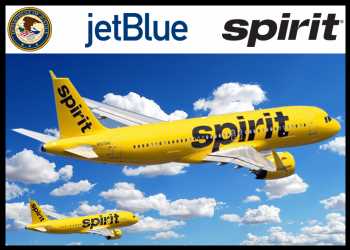US Justice Department Sues To Block Proposed JetBlue- Spirit Merger
The US Justice Department or DOJ has filed a civil antitrust lawsuit to block JetBlue Airways Corp.’s proposed $3.8 billion acquisition of its largest and fastest-growing ultra-low-cost rival, Spirit Airlines, Inc., saying the deal is presumptively anticompetitive.
The lawsuit, filed in the District of Massachusetts, alleges that the acquisition would allow JetBlue to eliminate its largest ultra-low-cost rival, resulting in fare hike and reduction in choices that would particularly hurt cost-conscious travelers.
Meanwhile, JetBlue and Spirit, in their joint response to the lawsuit, said the companies are confident that the proposed merger is procompetitive, and will continue to advance their plan to create the most compelling national low-fare challenger to the dominant U.S. Carriers.
JetBlue CEO Robin Hayes noted that the DOJ has got it wrong on the law and misses the point that the merger would create a national low-fare, high-quality competitor to the Big Four carriers which, thanks to their own DOJ-approved mergers, control about 80% of the U.S. market.
The companies also said they have secured a settlement with the State of Florida supporting the merger, which will deliver new jobs, as JetBlue adds its low-fare flights in airports across the state.
It was in July last year that New York -based JetBlue agreed to acquire Florida-based Spirit for $33.50 per share in cash, at an aggregate equity value of $3.8 billion and an adjusted enterprise value of $7.6 billion.
In its statement, DOJ noted that Spirit’s low-cost, no-frills flying option has brought lower fares and more options to routes across the country. But, the complaint alleges that JetBlue’s acquisition of Spirit would eliminate the Spirit Effect, where Spirit’s presence in a market forces other air carriers, including JetBlue, to lower their fares.
By eliminating that competition and further consolidating the United States airlines industry, the proposed deal is feared to increase fares and reduce choices for travelers. It could also raise costs for the flying public and harm cost-conscious fliers most acutely.
It is also apprehended that the deal would eliminate half of the ultra-low-cost capacity in the United States.
The DOJ noted that the proposed deal, if successful, would raise prices on routes where the two airlines currently compete. This is particularly the case on the over 40 direct routes where the two companies’ combined market shares are so high.
Principal Deputy Assistant Attorney General Doha Mekki of the Justice Department’s Antitrust Division, said, “Whether they fly Spirit or not, travelers throughout the United States benefit from an independent Spirit because where Spirit competes, other airlines – including JetBlue – are forced to compete more vigorously by lowering fares, offering greater innovations, and delivering more consumer choice. This transaction occurs against the backdrop of years of airline consolidation in the United States.”
Source: Read Full Article

